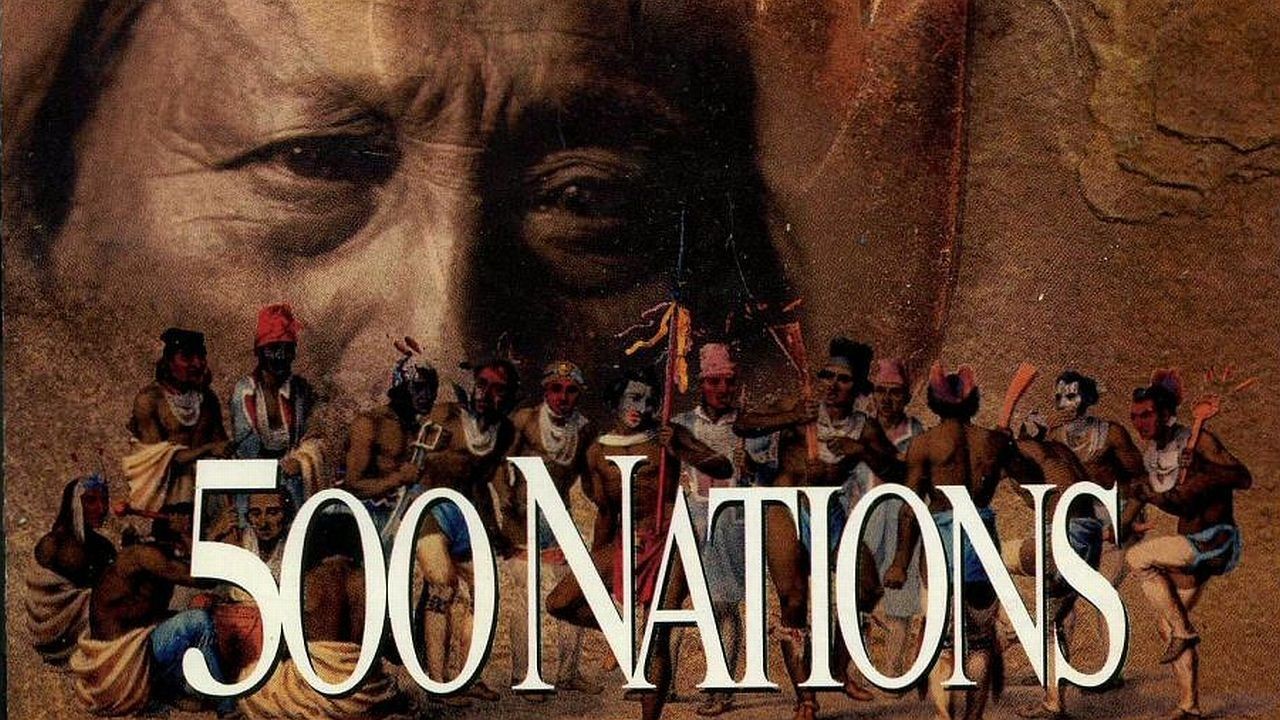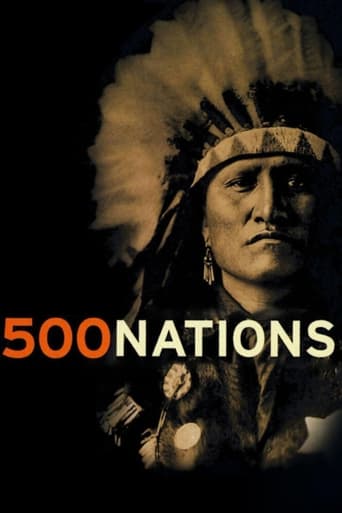

It's not great by any means, but it's a pretty good movie that didn't leave me filled with regret for investing time in it.
... View MoreVery interesting film. Was caught on the premise when seeing the trailer but unsure as to what the outcome would be for the showing. As it turns out, it was a very good film.
... View MoreThis film is so real. It treats its characters with so much care and sensitivity.
... View MoreThe film may be flawed, but its message is not.
... View MoreI can remember first watching this series when I stumbled upon it one summer in 2001, and I became both fascinated and depressed with what this series presented. In fact, this series changed my perspective of the original Americans forever, seeing them as genuine humans with plenty of stories to tell and how they were respectful of the Earth we are standing on. What shocked me was the cruel treatment from the Europeans whether it was the attempted conversion to the treacherous methods of mass slaughter that obliterated many of the nations. The interviews with the real Native Americans further fascinated me with their cultural ways and perspectives on European conquest (except for those that did offer hospitality). Kevin Costner is a great host, perfect for the part from his Dances with Wolves work. He deserves a humanitarian award for mentioning the once great folk that walked the Americas and how they should be recognized and respected.
... View MoreFor people of European descent who believe that their ancestors brought enlightenment and "civilization" to the Americas, this should be a lesson in humility. For among the some 500 native American nations, there were those that practiced direct democracy (the Oneida), built cities, organized federations of tribes (the Sioux) and administered empires (the Aztecs and Incas).The tragic history of the native Americans is laid bare as hitherto little known details as to how they were systematically deprived of land, food and sometimes outrightly massacred are brought to light. Most shocking was the revelation that US government officials murdered Amerindians in reservations by giving them blankets used by victims of smallpox. Moreover, moving them to reservations far from their native environment deprived them not only of food but also of the plants that they used as medicine. The buffalo was hunted to near extinction by government hired hunters like Buffalo Bill in order to starve the Plains Indians. The Cherokee who adapted to the white man's culture, became successful farmers and entrepreneurs were disenfranchised - their properties seized and the whole nation sent to reservations. The episode about the "Trail of Tears" was heart wrenching.The most interesting part for me was the exposition of the North Amerindians' cosmological and religious beliefs. For example, one North American nation believed that God placed them in an ideal world akin to paradise. This would imply that they do not long for an afterlife.I don't know if it was in this series, but I recently found out that the Black American Indian contingent in the New Orleans Mardi Gras is not merely the product of fiesta fantasy. Those people really have a claim to native American ancestry as when the US army and the settlers were exterminating the Indians, African Americans in Louisiana absorbed those coming their way into their community to protect them. I understand some of the Seminoles who were hunted into the everglades of Florida managed to find their way into the black community of New Orleans. This resulted in an admixture of the two races. This brings to mind the American blacks who were in the US invading force during the Philippine-American War who joined the Filipinos. Obviously, they saw the war as a battle between races and it they decided they belonged to the colored side. Unfortunately, they were later captured and executed. If you like movies that are sympathetic to the Amerindians, see also Soldier Blue, Dances with Wolves, The Royal Hunt of the Sun and Geronimo: An American Legend.
... View MoreFascinating amount of detail on AmerIndian history.It's also however extremely one sided.We don't hear about all of the endemic massacres by Indians of whites from the get go, through the whole thing. We also don't get any context. I.e., everyone believed in conquest against deeply foreign peoples not sharing the same religion/world view in the 17th, 18th and 19th centuries.Certainly AmerIndians did, most of whom lived in states of endemic (as in yearly or more often) warfare, including often the extremely cruel torture of their captured enemies. E.g. the Hurons in common with many Great Lake tribes skinned alive their captives in ritual fashion back in their own home villages. For those not committed to reading source history, the movie Black Robe (which takes a quite neutral and or mutually critical cultural stance) is informative in this regard.The current view that conquest is horrible and likely to be called genocide is unique, at least among winning societies (and usually among everyone), in world history. The AmerIndians were the ones who taught total war to the whites early in the 1600s near the Atlantic coast, killing old women and children, as well as all men combatants (or not), and taking the younger attractive women as additional wives / concubines / sex slaves. This had been the form of warfare they had waged amongst themselves before first contact with Europeans. Read Thomas Sowell in "Conquest and Cultures" on the Amerindian issues. Sober, balanced, and most interesting.There's no question that Euro-Americans committed many atrocities against AmerIndians, as amply reported in this series. But to watch this series you'd think that Indians never killed their enemy's women and children or took them as slaves. In fact many tribes usually did one or the other as a matter of their avowed tribal political and religious policy whenever they had the chance whenever they were at war. In contrast it was never or almost never the policy of the British or national American government to kill not only enemy men (combatants) but also women and children -- although it certainly sometimes was the policy of some local militia commanders, and later of some great plains and western Army commanders -- and sometimes in a winking way some frontier governors. However, shamefully, the "removal", i.e. "ethnic cleansing" of AmerIndians to points ever further to western semi or actual badlands was far too often official policy. This was partly in response to endemic guerrilla war and partly simply in response to endemic lobbying by land hungry whites (the only side of it we hear in this one sided, propaganda-lite series). Andrew Jackson's removal policy against the successfully settled, agricultural, for the most part no longer guerrilla raiding, and semi-assimilating Cherokee, known as the "trail of tears", is probably the most shameful of all instances of this. This is of course amply reporter here, though also of course, with the Cherokees totally and completely without fault or threat.All history has some point of view. At a (desireable) minimus, one always has to edit what down to what is most important. Nonetheless, when the "victim" (under the approach of this series and many other works) is virtually completely without fault (a rare reference to increasing alcoholism solely of course as a response to victimization not really excepted), and certainly without any independent capacity for aggression other than belated and regretfully ineffective defense, a work may be hard to distinguish from propaganda.Now if two competing propagandas on the same topic were aired back to back, that would have been another thing.
... View MoreI can remember first seeing this documentary almost seven years ago and at the time, I was completely fascinated by so many unknown truths that this documentary uncovered. There are so many things that are not taught about the Native American struggle in our country. Many of the things in this documentary are simply not talked about in schools when I was growing up. I wish I could remember more details of this great documentary but it has been seven years. Kevin Costner did a wonderful job producing and hosting this mini-series. Perhaps he was inspired after making "Dances with Wolves". Whatever the reason, this mini-series will always stand out for its stunningly beautiful and tragic portrayal of Native American history in the Americas.
... View More